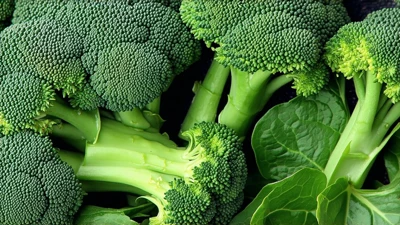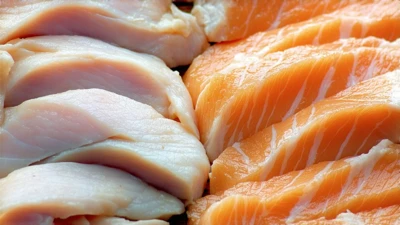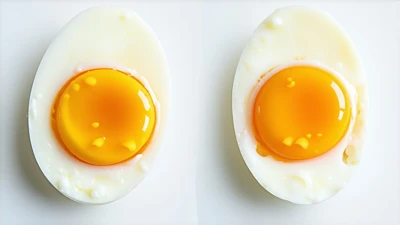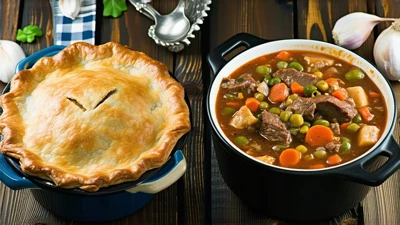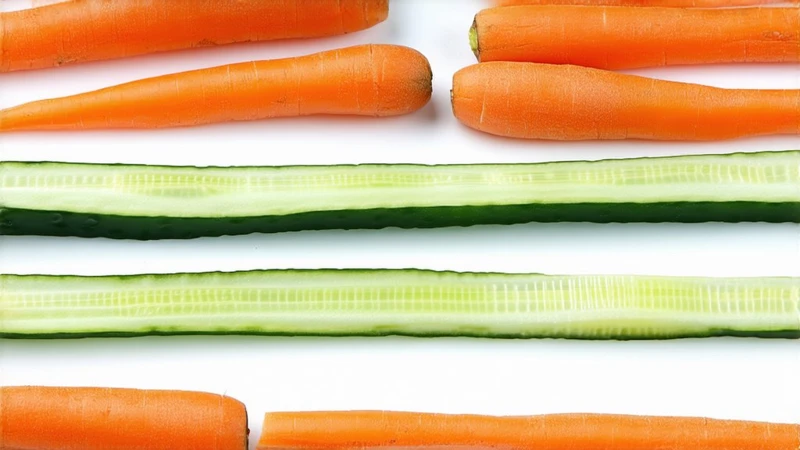
Which Is Healthier for a Snack: Baby Carrots or Cucumber Slices?
In the world of healthy snacks, baby carrots and cucumber slices are as ubiquitous as it gets. Both are crunchy, refreshing and nutrient-dense, but they serve different dietary needs and taste preferences. This piece goes bird by bird to see who comes out on top, considering 30 different attributes — everything from nutritional profiles to cultural predilections — to ensure you make the choice that's best for you.
Nutritional Comparison of Baby Carrots vs. Cucumber Slices
Let's start with the basics. Here's a breakdown of nutritional value per 100g of raw baby carrots and cucumber slices side-by-side (data compiled from USDA):
| Nutrient | Baby Carrots | Cucumber Slices |
|---|---|---|
| Calories | 41 kcal | 16 kcal |
| Carbohydrates | 9.6g | 3.6g |
| Fiber | 2.8g | 0.5g |
| Sugars | 4.7g | 1.7g |
| Protein | 0.9g | 0.7g |
| Vitamin A | 106% DV | 1% DV |
| Vitamin K | 13% DV | 16% DV |
| Potassium | 320mg | 147mg |
| Water Content | 88% | 95% |
Bottom line: Baby carrots are packed with vitamins and fiber and potassium; cucumbers are lower in calories and win out on hydration.
Calorie Comparison: Baby Carrots and Cucumber Slices
Cucumbers are the clear winners for calorie-conscious snackers. They're at 16 kcal per 100g, making them one of the lowest-cal veggies going. Still low, but they aren't quite so low at 41 kcal/100g — baby carrots are more than double the calorie density. That makes cucumbers perfect for restrictive diets, while both land comfortably on weight management plans.
Baby Carrots vs. Cucumbers: Vitamin A Levels
Baby carrots really shine here at a whopping 106% of Daily Value (DV) giving of vitamin A in 100g, and vitamin A is critical for eye health, immune system and integumentary system (skin)! Cucumbers, which contain just 1% DV, trail way behind. When it comes to vitamin A, it's carrot all the way.
Hydration Advantage: Cucumber Slices or Baby Carrots
Watermelon — 92% water Watermelon is one of the best choices for rehydration due to its 95% water content. A 2021 study published in Nutrients found cucumbers to be useful for post-exercise recovery for their electrolyte content. Baby carrots are still hydrating (88% water) but less so than cucumbers.
Digestive Health: Comparison of Fiber Content
Fiber is where baby carrots have the edge. With 2.8g per 100g, they provide 11% of the daily recommended intake, helping with digestion and keeping you full. Yeah, those contain only 0.5g of fiber, so this is a terrible food for a diet focused on fiber!
Sugar from Nature: Amount of Sugar in Baby Carrots vs. Cucumbers
Baby carrots are high in sugar (4.7g/100g), while cucumber is low (1.7g). Both vegetables are not high in sugar, but cucumber can be a better option for diabetics because of its lower glycemic load.
Crunch Factor: I like crunchy things when snacking
Texture is subjective. Baby carrots have a dense, earthy crunch; cucumbers have a light, watery crispness. In fact, according to a 2023 SnackFacts survey, 58% of Americans prefer to dip carrots, thanks to their satisfying crunch, versus 42% who said cucumbers are their go-to vehicle for dips, as they can pack a refreshing crunch.
Sweet is the Key Word for the first (flavor profile difference) and the second is Mild
Because of their sugar content, baby carrots are slightly sweet and go with savory dips. Cucumbers have a milder flavor and are slightly bitter, which makes them versatile for both sweet and savory uses.
Dipping Companions For Each Snack
Baby Carrots: Are best matched with hummus, ranch or guacamole to balance their sweetness.
Cucumber Slices: Pair with tzatziki, yogurt dip or vinaigrettes.
Health Benefits of Carrots vs Cucumber for Eye Health
Carrots have been longer known for eye health because of their beta-carotene (vitamin A precursor). Those who ate carrots regularly had a 25% lower risk of age-related macular degeneration, according to a 2020 study in JAMA Ophthalmology. Cucumbers lack this benefit.
Comparison of Antioxidant Content
Carrots are rich in the antioxidants beta-carotene and lutein, which help fight oxidative stress. Cucumbers also contain anti-inflammatory flavonoids such as fisetin. Both are good, but carrots contain a wider range of antioxidants.
Comparison of Low-Calorie Snacking Choices
Cucumbers are one of the lowest calorie snacks, perfect for a ketogenic or fasting diet. Though they contain some more carbs than full-sized carrots, baby carrots also qualify as low-calorie.
Nutrition Considerations for a Keto-Friendly Snack
Both belong on keto diets, though cucumbers win by a landslide — they are considerably lower in net carbs (3.6g per 100g compared to carrots' 9.6g).
Vegan- and Vegetarian-Friendly Compatibility
Neither need adapting (both are naturally vegan and vegetarian friendly).
Prepping Time and Ease
Baby carrots, on the other hand, are prewashed and ready to eat; cucumbers need peeling and slicing. Baby carrots save 5–7 minutes of prep time for busy people.
Shelf Life and Storage Requirements
Baby carrots have a shelf life of 3–4 weeks in the refrigerator; cucumbers, 1–2. Pack cucumbers in one of those open perforated bags to avoid wetness.
Ideal for Snacking on the Go
Baby carrots have the advantage here because they're sold as single-serve packs. Must be sliced beforehand, making cucumbers less portable
Seasonal Availability and Freshness
Both of those are available throughout the year in the U.S., though cucumbers have their peak season in summer and carrots have theirs in fall.
Growing Carrots Vs. Cucumbers Environmental Impact
A 2022 Journal of Environmental Studies report found that carrots use 3x less water per pound than cucumbers. Cucumbers are faster to grow, so they take up less land.
Cost Comparison per Serving
| Item | Price per Pound (USD) | Serving Size (g) | Cost per Serving |
|---|---|---|---|
| Baby Carrots | $1.50 | 100g | $0.34 |
| Cucumber Slices | $0.99 | 100g | $0.22 |
Cucumbers are low-cost much as sundried are, however both are incoming cheap.
Suitable for Kids' Snacks and Lunchboxes
Both are kid-friendly, but baby carrots are a choking hazard for kids younger than 3. For little kids, slice cucumbers thinly.
Cucumber's Water Content: Digestive Health Benefits
Because cucumbers are so water-rich, they help to support digestion by preventing constipation and facilitating gut motility.
Diabetic Considerations for Blood Sugar
Even though there is more sugar, baby carrots have a Glycemic Index (GI) of 39 (low) and cucumbers have a GI of 15. Both are acceptable diabetic-wise in moderation.
More Than Just a Quick Snack: Culinary Diversity
Carrots are a staple in stews, roasts and baked goods. Cucumbers shine in salads, pickles and cold soups like gazpacho.
Popularity in Different Types of Cuisines
Carrots are ubiquitous in European and Asian cuisine (e.g., carrot cake, kimchi). Cucumbers reign in Mediterranean and Middle Eastern cooking (e.g., Greek salad, raita).
Allergens: The Ones To Watch Out For
Neither are common allergens but in rare cases this can cause cross-reactivity with pollen (oral allergy syndrome).
Snacks That Are Good For Losing Weight
"Cucumbers have a very low-calorie content, and with such high water composition, they allow for a sense of fullness without bringing extra calories in,". Fiber in baby carrots also helps with weight loss.
Enhancing with Herbs and Spices
Carrots: Add cumin, paprika or fresh parsley.
Cucumbers: Spice it up with dill, mint or chili flakes.
Nutrient Density per Calorie
Carrots also offer more vitamins and minerals per calorie — that means they are more nutrient-dense.
Cultural Preferences and Traditional Uses
In the U.S., baby carrots are the best-selling vegetable for snacking, while cucumbers reign in juice cleanses and spa cuisine.
Final Verdict
Choose baby carrots if:
You consider vitamin A, fiber, and nutrient density.
You require a snack that is portable and ready to consume.
Opt for cucumber slices if:
Hydration, low-calorie, or keto-friendly are important.
You want a non Invasive flavor and cost-effective.
In the end, the best choice depends on your dietary goals and taste preferences. Why not enjoy both? Serve some carrot sticks with hummus, and some cucumber slices with tzatziki for an even more rounded out snack plate!
Data Sources: USDA FoodData Central, JAMA Ophthalmology, Journal of Environmental Studies, SnackFacts 2023 Survey










